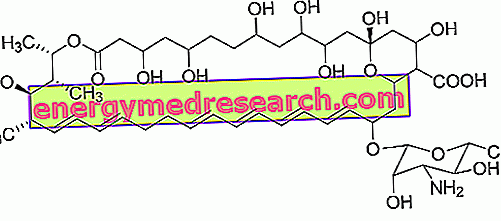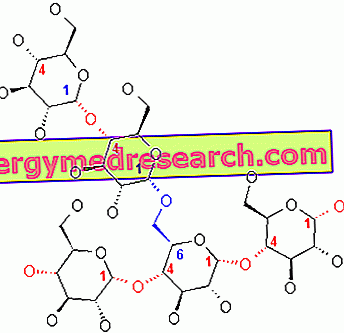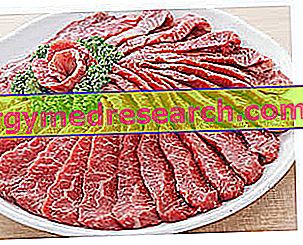Nystatin is a potent antifungal (or antifungal) drug that was first isolated from cultures of Streptomyces noursei .
Nystatin is particularly useful for the treatment of fungal infections of the skin and mucous membranes.

Nystatin - Chemical Structure
Indications
For what it uses
The use of nystatin is indicated for:
- Prevention and treatment of mouth infections caused by fungi of the genus Candida in both pediatric patients (from one month of life to 18 years of age) and adults;
- Prevention of oral infections caused by Candida albicans (thrush or oral candidiasis) in newborns up to one month old.
Warnings
Nystatin acts only locally (because it is little absorbed), therefore, its use is not indicated for the treatment of systemic fungal infections.
If any type of allergic reaction occurs during nystatin therapy, treatment with the drug should be stopped immediately.
Before starting treatment with nystatin and throughout its duration, good oral hygiene must be maintained.
Interactions
No cases of interactions with other drugs have been reported following administration of nystatin. This is probably due to the poor systemic absorption of the drug itself.
In any case, it is always good to inform your doctor if you are taking - or if you have recently been - medicines of any kind, including non-prescription medicines and herbal and / or homeopathic products.
Side effects
Nystatin can cause some types of side effects, although not all patients experience them. This is due to the different sensitivity that each individual has towards the drug. Therefore, it is said that the adverse effects do not all occur with the same intensity in each patient.
The main side effects that may occur during treatment with nystatin are listed below.
Allergic reactions
Nystatin can trigger allergic reactions in sensitive individuals. These reactions can occur with symptoms such as:
- Skin eruptions;
- Urticaria;
- Angioedema;
- Stevens-Johnson syndrome.
Gastrointestinal disorders
Nausea, vomiting, diarrhea and abdominal discomfort may occur during nystatin therapy.
Skin and subcutaneous tissue disorders
Treatment with nystatin can promote the appearance of rash and hives.
Overdose
If overdose of nystatin is taken, nausea and disorders affecting the gastrointestinal system may occur.
If nystatin overdose is suspected, contact your doctor immediately or go to the nearest hospital.
Action mechanism
Nystatin is a polyene antifungal and, as such, performs its action by altering the cell membrane of fungi.
Nystatin - like all polyene antifungals - has a high affinity for cell membranes containing sterols. More in detail, nystatin has a great affinity for ergosterol-containing membranes (like those of mushrooms, in fact).
Nystatin is able to insert itself within the fungal cell membrane and increase its permeability.
This increased permeability causes fungal cells to lose constituents that are essential to them (such as ions and small organic molecules) and, consequently, die.
Mode of Use - Posology
Nystatin is available for oral administration as an oral suspension.
The doses of drug administered vary according to the age of the patients and must be established by the doctor, as well as the duration of the treatment.
Below are some indications on doses of nystatin usually used in therapy. However, if deemed necessary, the doctor may decide to increase the amount of drug to be administered.
Prevention and treatment of Candida mouth infections in adults and children
To treat and prevent this type of infection in adult patients and in children and adolescents from 2 to 18 years of age, the dose of nystatin usually used is 400, 000 to 600, 000 IU, to be taken four times a day.
In children from one month of age to two years of age, the dose of nystatin usually given is 200, 000 IU four times a day.
Prevention of oral candidiasis (or thrush) in newborns
For the prevention of oral candidiasis in newborns up to one month of age, the dose of nystatin usually administered is 100, 000 IU per day.
Pregnancy and breastfeeding
The use of nystatin by pregnant women should only be carried out if it is indispensable and only if the expected potential benefits for the mother outweigh the potential risks to the fetus.
In any case, before taking nystatin, both pregnant women and mothers who are breast-feeding must absolutely seek medical advice.
Contraindications
The use of nystatin is contraindicated in patients with known hypersensitivity to nystatin.



